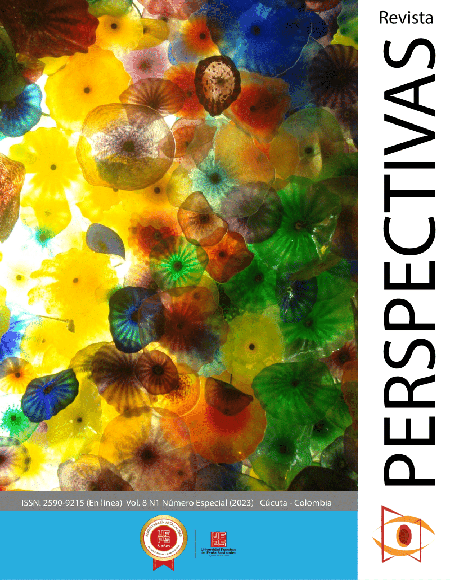Creative writing: significant experiences and trends in textual production
Escritura creativa: experiencias significativas y tendencias en producción textual
Main Article Content
This qualitative study with a phenomenological-hermeneutic approach aims to promote creative writing by associating significant experiences and trends in written production in secondary education. A focus group was used with 25 such as participants, they were active actors in training and producing text. The results focused on the organizational immersion in creative writing in phase I, and in the phase II the structure of the eighth dimension of Kike Maillo was applied. The relevant Findings in the execution process during two years of work in the classroom were the performance of reading comprehension activities, firstly, 25 books were read per year and training was given on how to start the creative writing processes in the tenth grades. These activities were binding and dialogic between peers to systematize collaborative learning during medium, short, and long-term periods. One of the most concrete significant experiences was the written production of 20 stories with diverse themes where spiral narratives were used. All of this was the result of recognizing the written and imaginary production trends that focus on subjective actions and situations involving fictitious realities that are dynamic in social contexts. The conclusions focused on the experiences that each participant producer has had during their daily lives, this has contributed significantly to the textual production, since it is a source of inspiration to start activities that attract attention and common interest. of the students that strengthen the addressed competence.
Downloads
Article Details
Aprendemos juntos V. Completa. (07 octubre 2020) Las claves educativas en la era de la inteligencia artificial. Kai-Fu Lee, experto IA. [Video]. YouTube. https://www.youtube.com/watch?v=18 QBF0LifbY
Audi Spain (17 de octubre 2018). La Octava Dimensión-Four Rings Studio. https://www.youtube.com/watch?v= PtzSzyAwpZ4&t=87s
Bouchard r. y Kadi l. (2011) « Didactique de l’écrit et nouvelles pratiques d’écriture », Université Lumière Lyon 2, France. Université Badji Mokhtar D’Annaba, Algérie. Les Applications N° 51, in Le Français dans Le Monde. 2012.
Blanco, G. A, (2021). Acción social y escritura creativa: un binomio fructífero. Journal of the Sociology and Theory of Religion, 13: 48-79. https://doi.org/10.24197/jstr.1.2022.48- 79 DOI: https://doi.org/10.24197/jstr.1.2022.48-79
Camps, Anna. (2003). Miradas diversas a la enseñanza y el aprendizaje de la composición escrita. Lectura y vida, 24(4), 2-11
Cassany,Daniel. (1990). Enfoques didácticos para la enseñanza de la expresión escrita. Comunicación, Lenguaje y Educación,6, 63-80 DOI: https://doi.org/10.1080/02147033.1990.10820934
Casasa Núñez, L. (2023). Concibiendo la escritura: Enfoques teóricos y metodológicos sobre la producción escrita a través del tiempo. Káñina, 47(3),7–31. https://doi.org/10.15517/rk.v47i3.5620 3 DOI: https://doi.org/10.15517/rk.v47i3.56203
Couto-Cantero, P. (2023). El modelo de la transpodidáctica textual para el aprendizaje de lenguas y culturas. "Yuche y los ticunas". Folios, (58). https://doi.org/10.17227/folios.58-1604 9 DOI: https://doi.org/10.17227/folios.58-16049
Delgado-Gómez, A. M., Núñez-León, J., & Leite-Méndez, A. E. (2019). Historias de vida docentes: Nuevas miradas en el tiempo. In M. J. Márquez-García, P. Cortés-González,A. E. Leite-Méndez, & I. J. Espinosa-Torres (Coords.), Narrativas de vida en educación: Diálogos para el cambio social (pp. 173-201). Octaedro.
Kwan Chung, C. K., & Alegre Brítez, M. Ángel. (2023). Teoría Interpretativa y su relación con la investigación cualitativa. Revista UNIDA Científica, 7(1), 46–52. Recuperado a partir de https://revistacientifica.unida.edu.py/pu blicaciones/index.php/cientifica/article/ view/139
Jiménez, H. G., & Elías, B. C. (2021). Impactos de la pandemia covid-19 en el rendimiento académico universitario durante la transición a la educación virtual. Revista pedagógica, 23, 1-29. Frugoni, S. (2006). Imaginación y escritura. La enseñanza de la escritura en la escuela. Buenos Aires: Libros del Zorzal. DOI: https://doi.org/10.22196/rp.v22i0.6153
Gonzales Velázquez, L.G (2020). Estrés académico en estudiantes universitarios asociados a la pandemia de COVID-19, espacio ±D, invocación más desarrollo, 9 (25). https://espacioimasd.unach.mx/index.p hp/Inicio/article/view/249/782 DOI: https://doi.org/10.31644/IMASD.25.2020.a10
Heredia Vergara, J. C., & Mercado Ramos, D. M. (2023). Escritura creativa en ambientes socioculturales para el fortalecimiento de la producción textual, en los estudiantes de grado cuarto. Ciencia Latina Revista Científica Multidisciplinar, 7(1), 5191-5205. https://doi.org/10.37811/cl_rcm.v7i1.48 24 DOI: https://doi.org/10.37811/cl_rcm.v7i1.4824
Hernández Hernández, M. D. (2023). Una aproximación a las prácticas de enseñanza de la educación artística: perspectivas de estudiantes y docentes de los colegios oficiales de la UPZ Tintal Sur de Bogotá. Retrieved from https://ciencia.lasalle.edu.co/doct_edu cacion_sociedad/81
Ministerio de Educación Nacional. (2016). Derechos Básicos de Aprendizaje. https://www.colombiaaprende.edu.co/s ites/default/files/files_public/2022- 06/DBA_Lenguaje-min.pdf
Mora Mora Ramirez, R. (2022). 19.- El valor de la investigación cualitativa y la comprensión: Un examen crítico. Revista EDUCARE - UPEL-IPB -Segunda Nueva Etapa 2.0, 26(1),389–405.https://doi.org/10.46498/reduipb.v26i1. 1625 DOI: https://doi.org/10.46498/reduipb.v26i1.1625
Mostacero, Rudy. (2017). Modelos para enseñar y aprender a escribir: bosquejo histórico. Lenguaje, 45(2), 247-274. DOI: https://doi.org/10.25100/lenguaje.v45i2.5272
Piñeiro, N., & del Rosario, M. (2023). Leer, escribir, jugar. Libros infantiles para la escritura creativa. https://redined.educacion.gob.es/xmlui
/handle/11162/239563
Suárez, I. T., Varguillas, C. S., & Ronceros Morales, C. (2022). Técnicas e instrumentos de investigación. Diseño y validación desde la perspectiva cuantitativa. https://repositorio.upsjb.edu.pe/handle/ 20.500.14308/4759 DOI: https://doi.org/10.46498/upelipb.lib.0013
VIGNER, G. (2012) « Écrire en FLE. Quel enseignement pour que l’apprentissage » recherches et applications – le français dans le monde, pp.16 -32.
Ceballos Lopez, S. L., Monroy, O. P., & Ríos Botero, A. V. (2023). La literatura infantil colombiana como medio para fortalecer los procesos de lectura y escritura en la escuela rural. https://bibliotecadigital.udea.edu.co/bit stream/10495/35879/1/CeballosLoren a_2023_LiteraturaInfantilColombiana.pdf







